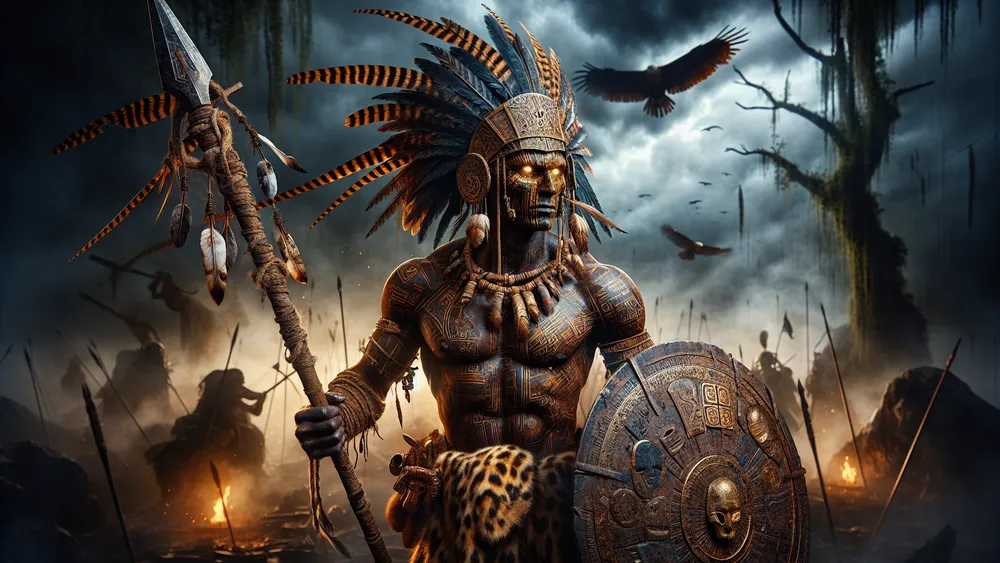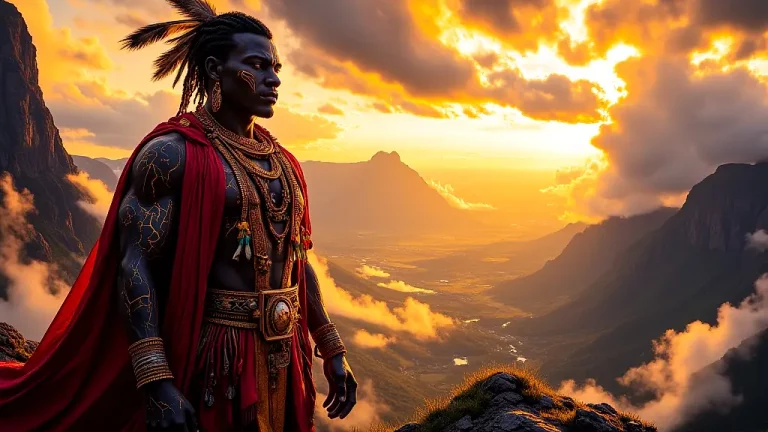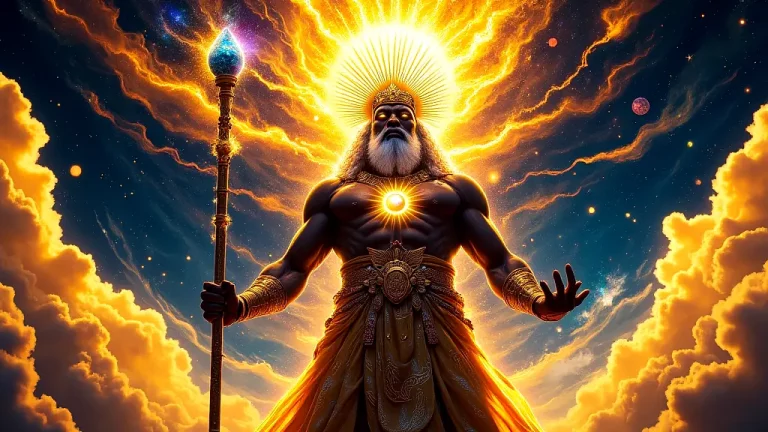Kibuka: The Buganda War God And His Legendary Battles
In many old societies, war wasn’t just for kings and army leaders. The gods had a part in it too. Just like the Greeks had Ares and the Norse had Odin, the Buganda Kingdom, which is now in Uganda, looked to Kibuka, their god of war, when they needed help in battle.
Key Points:
- Kibuka was Buganda’s war god, believed to fight from above, making enemies panic.
- He was the son of Mulungu, the main god, and brother to Mukasa, who was tied to water and peace.
- Buganda needed him because Bunyoro, their rival, was stronger, and leaders wanted help beyond soldiers.
- His secret, that he landed after battles, was told by a woman, leading to his ambush and death.
- After he died, warriors still honored him with sacrifices, prayers, and cleansing rituals before fights.
- His shrine later faded as different religions spread, and its exact location became unknown over time.
- Some believe his spirit still lingers, affecting those who lead in battle, even in today’s conflicts.
Many people outside East Africa don’t know his name, but he was very important to Buganda, helping them grow stronger, both in military skill and in power that wasn’t human. People did not see Kibuka fighting like a normal soldier on the ground. Instead, stories say he fought from the sky, attacking without being spotted, making his enemies afraid before they even knew where he was.
He wasn’t a normal warrior, and that made him hard to beat. But things didn’t stay that way. In the end, something led to his fall. This post talks about where Kibuka’s story began, the battles people believe he was part of, and the ways people honored him.
Also, it looks at how his presence shaped Buganda’s ability to fight and why, even now, people still think about him in their culture.
Kibuka: Overview and Key Facts
| Key Aspect | Details |
|---|---|
| Name | Kibuka |
| Role | God of war for the Buganda Kingdom |
| Who His Father Was | Mulungu, believed to have created everything in Buganda stories |
| Main Area of Power | Battles, military thinking, and skills beyond what humans had |
| What Made Him Different | Fought from above and could not be seen by his enemies |
| Why He Was Important | Helped Buganda’s soldiers defeat their foes by giving them power that was above normal |
| Who He Fought Against | The Bunyoro Kingdom, an old enemy of Buganda |
| What Led to His End | A woman who was made to serve others gave away his secret to Bunyoro’s people |
| How He Died | Was hurt too badly by enemy fighters, left to the trees, and passed away there |
| How People Worshipped Him | Before fights, warriors asked him for help. People made offerings at a place built for him. |
| Memory of Him Today | That place was left behind, but people still talk about him in Buganda’s old stories. |
Where Kibuka Came From – The War God People Forgot
If people want to understand how Kibuka became feared, they must first look at where he came from and the myths about his family. His story does not start with his fights or victories. Instead, it begins with Mulungu, the god that people in Buganda thought had created everything.
Because of things that happened long ago, Kibuka got the place that made him important in wars, and that is where his name started to mean power.
Kibuka’s Family Tree and His Link to Mulungu
Buganda stories say that Kibuka was the son of Mulungu, the most important god who made everything. Mulungu was not always watching over people or involved in their lives. Instead, he was seen as a god who stayed far away and made sure everything stayed in order.
This idea was not only in Buganda – it appeared in many different African traditions, where some of the most powerful gods were believed to live above everything, beyond human reach. Kibuka had a brother, Mukasa, a god connected to water and bringing good things to people. In the beginning, both brothers were not linked to war.
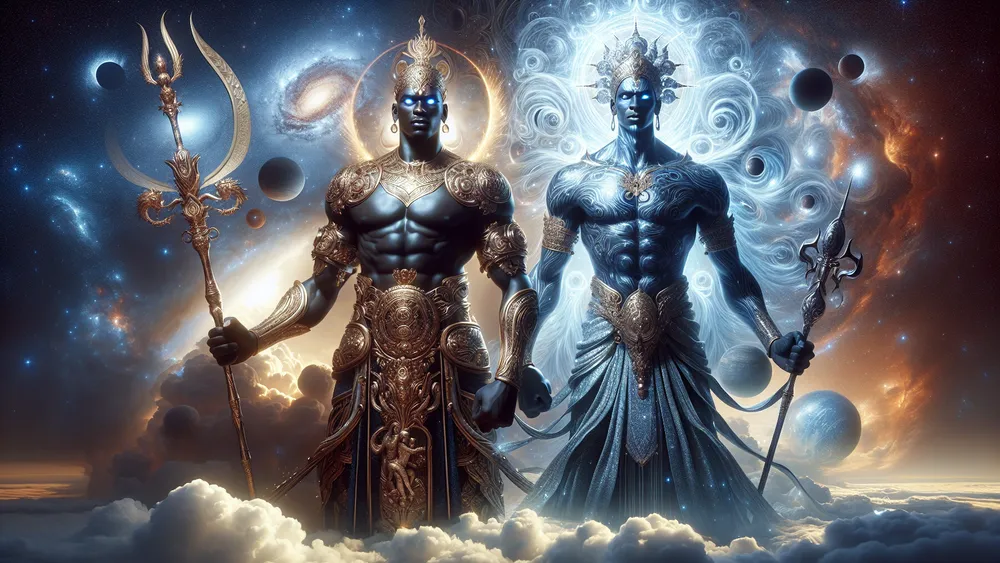
Mukasa was thought to bring peace and good life to Buganda, while Kibuka was more like a god of strength, staying in the sky and looking over things – but not acting much. But then, things became more dangerous for Buganda. People wanted a god who would do more than watch from above. So Kibuka became a war god that people respected and feared.
At first, Kibuka was a god of strength who stayed in the sky, but when Buganda needed protection, he became a feared and respected war god.
Why Buganda Needed a War God
Even though Buganda had a very strong army, the kingdom still needed help from gods to keep control over its land. Buganda was in a place where many others also wanted power, like Bunyoro, one of its biggest enemies. Fighting skill was important, but leaders thought it was not enough. They believed that gods controlled wars, deciding who would win and who would lose.
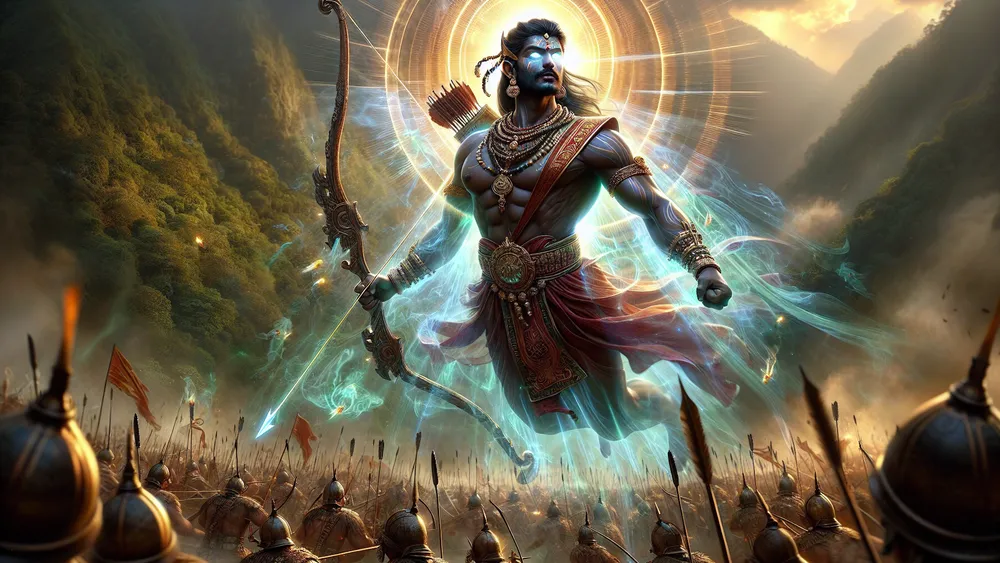
Many others in history thought the same. Greek soldiers asked Ares to make them stronger. Norse warriors wanted Odin to give them knowledge. People in Buganda believed Kibuka would lead them in war. His presence meant not only courage, but also that the gods were on their side. That gave them confidence. Bunyoro was the strongest power in the region at its peak.
Its warriors attacked Buganda often and did great damage. Without something more than soldiers and plans, Buganda was not strong enough. The leaders knew they needed an advantage besides their army. This is where Kibuka became important. He was believed to fight in ways humans could not – from above, in a way no enemy could see.
And if he was with them, warriors felt sure they would win, even if the battle seemed impossible. Making Kibuka part of war changed how Buganda fought. It made them believe more in victory, and because of that, they won more battles.
Where Kibuka Stood Among Other Gods
In Buganda stories, Kibuka had a different place among the gods. His job was only about war, while most others were linked to growing food, nature, or life itself. His brother Mukasa was connected to things like peace, water, and health. Kibuka, though, became important only when there was war, and people needed a god to turn to. But his importance was not just about battles.
Soldiers believed he helped them plan wars well, kept them safe when traveling, and made them stronger before they fought. His power was not only about fighting directly. His role also included things in war that people thought came from gods, like making enemies afraid or making sure wars happened the way the gods wanted them to.
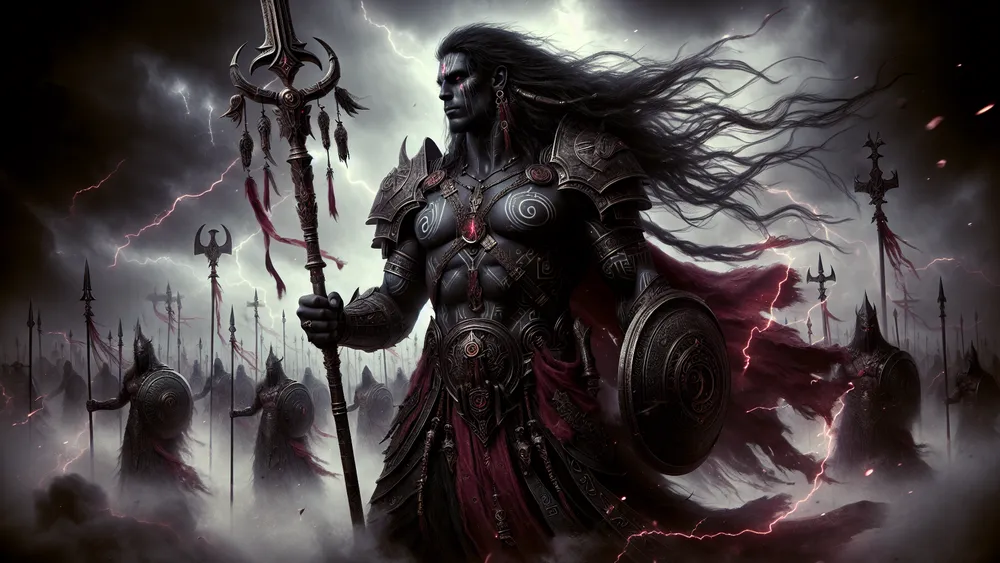
Because of this, people saw him as similar to Ogun in Yoruba beliefs, since Ogun was both a war god and a god of iron. However, Kibuka was only about war, unlike Ogun, who had other roles too. Most gods were asked for help in everyday things, but Kibuka was different. People called on him only when they had to fight and survive.
That made him the most important god for Buganda when there was war.
The Sky Warrior – Kibuka’s Battles and Legends
Kibuka’s job as a war god was not just an idea. People thought Kibuka was really in war. He was not just a story. They believed he helped their army, and what he did was frightening. During wars, Kibuka’s help was what made Buganda win, and that is how the kingdom became stronger.
Because of Kibuka’s power, enemies felt afraid in ways no soldiers could make them feel. It was more than just men fighting. It was a god fighting too.
Fighting the Bunyoro Kingdom
Of all the major battles in the region, the one between Buganda and Bunyoro was among the most important, changing the future of both kingdoms. Bunyoro was the strongest power at the time, and Buganda struggled to win against its larger army and well-planned military moves. To make the fight more even, the Kabaka, who was the Buganda king, called for help from Kibuka.
He had stayed in the world of the gods with his brother Mukasa. But Buganda needed him. It was then that Kibuka left the world of the gods. Buganda needed a leader, so he led them. But he was not like a human leader. He did not fight on the ground. Instead, he fought while staying in the skies, where no one could see him. His arrows never missed.
He shot them down at the Bunyoro fighters. This made the enemy confused. No one could see who was attacking them. Some tried to fight, but many ran, believing that something beyond the human world was attacking them.
Kibuka had three great advantages in battle:
- Unseen by the Enemy: He stayed in the air, where no one could see him, and that meant no one could fight back.
- Fighting from Above: His arrows came from far above, and he did not have to be close to the enemy to win.
- Fear Tactics: The enemy army panicked because they thought an invisible force was striking them, and this helped Buganda.
Using these, Kibuka led Buganda to victory against the powerful Bunyoro Kingdom, making sure people saw him as the most important god of war. But this unmatched power would not last forever. The enemy would keep watching, and they would find his secret weakness. That would lead to his fall.
The Betrayal That Brought Kibuka Down
For all his power, Kibuka was not defeated by strength. Betrayal defeated him. While he fought for Buganda, enemies could not see him. This made it impossible for them to fight back. But Bunyoro was desperate, and they finally discovered his weakness. A woman from Buganda was taken by Bunyoro’s spies. She was not a soldier.
She had no idea what she knew would help the enemy. She had seen Kibuka leave the sky and enter his hidden camp. She spoke this secret without knowing its weight. When the leaders of Bunyoro heard it, they came up with a plan. They had to wait for the only time Kibuka could be hurt.
Rather than fighting Buganda head-on, they moved their soldiers to the place where Kibuka would come down. They did not attack immediately. They waited. They waited for him to return again after attacking from the air. When he did, they were ready.
As he lowered himself from the sky into his safe camp, they shot their arrows at the sky, attacking the god they had never been able to touch. He was no longer untouchable. The Buganda warriors watched him fall. They had never seen this before. A god that could not be hurt was bleeding, wounded. Kibuka himself knew what this meant.
He would not win this time. He used what strength he had left and ran into the forest. There, far from his warriors, he fell to the ground. He did not get up. He died alone. Some say his last words were full of anger – the last words of a god who had been defeated not by strength, but by a secret. His body was gone, but his spirit did not leave.
People believed he remained in that place. They treated the land as sacred. They believed his power stayed there. But after Kibuka, Buganda no longer had a god to fight for them. That time had ended.
Kibuka was only defeated because a secret about his hidden camp was unknowingly shared, allowing his enemies to ambush him when he was vulnerable, and after his death, people believed his spirit remained in the place where he fell.
How the Baganda Honored Kibuka and His Lasting Impact
Kibuka had fallen, but people still remembered him. They did not forget the god who fought for Buganda. Even though he was gone, they made sure his name was not lost. Through ceremonies, places of worship, and traditions passed down, Kibuka remained in their lives. People still honored Kibuka, and in many ways, he was still there with them.
Worshiping Kibuka – Rites and Traditions
Kibuka was the most important war god in Buganda, and people believed his powers were real, not just stories. Warriors and their leaders could not fight without him. Before a major battle, they had to call on him so he would help them. They did this through special ceremonies for his blessing. There were sacrifices, prayers, and rituals that only priests knew how to do.
These priests, who were believed to be able to speak to Kibuka, would look for signs to see if he supported the war. If the signs were bad, leaders had decisions to make. Some waited. Others abandoned the fight completely. They feared what would happen if Kibuka did not protect them. The soldiers had their own rituals.
Before going into battle, they had to prepare. They would go through cleansing ceremonies, which purified them so they could fight without spiritual danger. Warriors sometimes covered their bodies with special substances that meant Kibuka would be with them. They left offerings at his shrine – food, weapons, or objects that were personal to them. Then they sang.
There were songs about Kibuka’s victories, songs about past battles, songs that asked him to fight alongside them. War leaders also danced. Their movements were like the way they believed Kibuka moved in the air, attacking enemies from above. They did this not just for Kibuka, but also for themselves, because a soldier who believed a god was on their side would fight harder.
The most important ways that people honored Kibuka were:
- Giving Sacrifices: They brought goats, chickens, and other gifts, hoping Kibuka would protect them.
- Reading Signs Through Priests: These priests looked for clues to decide if Kibuka’s support could be trusted.
- Preparing Warriors: They went through cleansing rites so their spirits would not be weak before battle.
- Warrior Traditions: They sang, prayed, and danced, all to make sure Kibuka was with them and to strengthen their will to fight.
Without these things, they believed they could not win. No battle was started unless Kibuka was honored first.
The Hidden Shrine of Kibuka and Its Legends
For many years, Kibuka’s shrine was one of the most respected places in Buganda. People kept worshiping him there, even after he was gone. They believed it was deep in the forests, the same place where Kibuka had gone before he died. A small group of priests took care of it. They were the only ones allowed to go inside the deepest part of the shrine, where they kept sacred objects.
These priests led rituals, gave offerings, and looked for signs to understand what Kibuka wanted. Warriors came from across the land to ask for his protection before battle. But later, fewer people visited. As Christianity and Islam spread in Buganda, people stopped coming to Kibuka’s shrine. It was no longer used, and then its location was forgotten. Some still believe the ruins are hidden in the forest, untouched and left behind.
Even though no one worships there anymore, some say Kibuka has not left. Stories tell of misfortunes happening to those who try to disturb what is left of his shrine. Some have spoken of people disappearing or seeing things they cannot explain. Elders warn travelers not to go too deep into the forest.
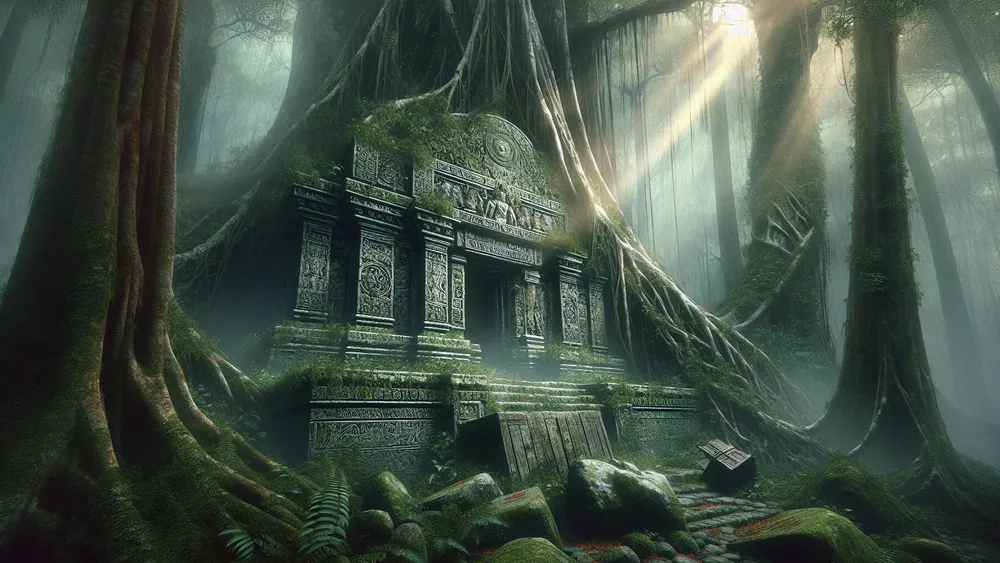
They believe Kibuka is still there, guarding the place where people once honored him. Other stories say something else. They describe unheard whispers moving through the trees, war drums playing when no one is there, and soldiers that no one can see. The stories may come from belief or fear, but for some, Kibuka’s name has never disappeared.
Kibuka’s Spirit and Its Connection to Modern Conflict
Even though Kibuka’s shrine has been mostly forgotten, many believe that his warrior spirit is still in the land. Some say his power appears during war, but not in a way that people can see. They believe he controls battles in ways that no one understands. When armies fight, some elders and spiritual leaders think Kibuka’s presence stays around those in charge, deciding if they win or lose.
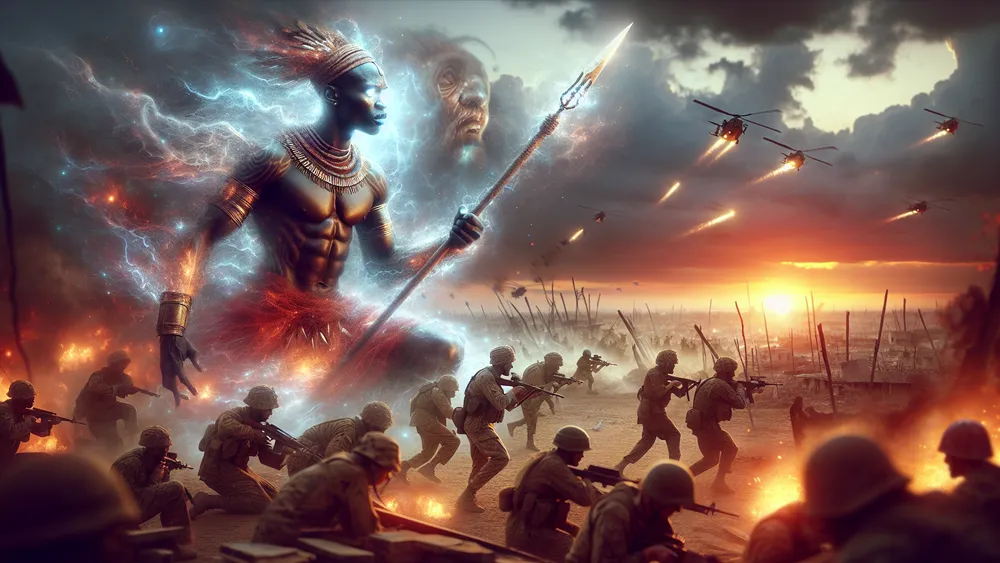
Some even believe that military leaders who are fearless, think quickly, or fight with extreme force may carry something of Kibuka in them. Maybe they know it. Maybe they do not. This belief is not only about Kibuka. In many African traditions, people think that ancestors and gods do not leave completely and that they still affect what happens today. Some people view Kibuka as just a historical war leader.
Others, however, believe he is still guarding warriors now. Either way, his name is still connected to war and leadership.
Warriors of the Gods – War Deities Across Africa
Across Africa, gods of war have been an important part of belief and tradition. They are linked to fighting, strategy, and the idea that wars can be influenced by something greater than people.
In West Africa, Ogun is not only thought of as a god of war but also connected to iron, blacksmiths, and tools. Many people see his power in both battles and in work that requires skill and craftsmanship. Some rulers from history are also remembered this way.
Nzinga Mbande, a queen from the Congo region, is often seen as more than just a leader. Many remember her for her strong military decisions and the way she stood against powerful enemies.
People did not just think about these gods as ideas, only existing in stories. Instead, they prayed to them before battle, giving offerings and asking for help, much like they did for Kibuka. People who want to read more about African mythology can check out this full list with all African Gods.
It has names of gods from all over the continent.
FAQs
1. Who was Kibuka, and why is he called the War God of Buganda?
Kibuka was a powerful deity in Buganda mythology, called the War God of Buganda because he was believed to lead the kingdom’s armies into battle from the skies, ensuring victory through divine intervention.
2. How did Kibuka influence the wars of the Buganda kingdom?
How Kibuka influenced the wars of the Buganda kingdom was through his divine intervention, where he fought invisibly from the skies, instilling fear in enemies and ensuring victory for Buganda.
3. What rituals were performed in Kibuka’s honor?
Rituals performed in Kibuka’s honor included elaborate war preparations, sacrificial offerings, and solemn prayers by Buganda warriors seeking his divine protection before battle.
4. What led to the downfall of Kibuka and his disappearance from active worship?
What led to the downfall of Kibuka was the betrayal by an enslaved woman who revealed his aerial battle strategy to the Bunyoro, leading to his mortal injury and eventual death, after which his worship declined over time.

